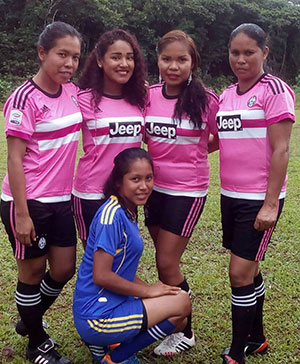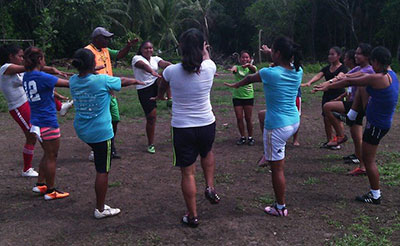– How football empowers young women in hinterland communities
By Ravena Gildharie
EVERY morning Verita Caesar, a 29-year-old mother of five of Trainline, Port Kaituma, juggles her household chores; prepares meals for the family, sees her spouse off to works, sends her kids to school and heads out in time for football training sessions between 6 and 8  am. There is practice in the afternoons too, all to ensure that the female footballers are in ‘tip-top’ shape for competitions.
am. There is practice in the afternoons too, all to ensure that the female footballers are in ‘tip-top’ shape for competitions.
Caesar currently captains the Port Kaituma United Women’s Football team, which has been in existence for over eight years. She is one of scores of females in hinterland communities where women’s football is a dominant sport, especially amidst limited employment, opportunities and co-curricular activities for young women.
There are female football teams in areas including Mabaruma, Sebai, Wauna, Matthew’s Ridge/Arakaka, Kamwatta and Waramuri in Region One; Wakapoa, Akawini, Kabakaburi, Mashabo, Capoey and Tapakuma in Region Two; Mahdia in Region Eight; Deep South, Central and North Rupununi in Region Nine and; Kwakwani/Aroaima in Region 10.
Teams from Kwakwani and several villages in the Rupununi recently participated in the just-concluded inaugural edition of Guyana’s National Women’s Development League, which forms part of efforts to increase participation in women’s football and to widen the national selection pool.
But, while the hinterland female footballers look forward to someday being drafted into the national team, they continue to develop and showcase their skills within their various communities and compete against neighbouring teams. Much of the teams’ activities are supported by donations from the business community and private individuals, while most of the players sponsor themselves in terms of purchasing the required outfits, footwear and other gear.
Though it is merely a hobby, football is gradually helping to empower the young women as they remain committed to training, boosting their talents and taking competitions seriously.
“After I left school, there was nothing else to do, and that’s when I started playing football to keep myself occupied…I realised I’ve made some wrong choices in my life early on, but football is a good thing for these girls and that is what I try to teach them; to educate themselves and be aware of other opportunities out there,” Caesar related.
Though she has not benefited from enhanced educational opportunities, Caesar is convinced that through football, young women can aim for greater heights and elevate their standards of living.
School dropouts & teenage pregnancy
She observed that in most cases in the hinterland,particularly in the mining hubs, after the girls would have completed secondary education or either dropped out of school, they would often get into intimate relationships and start bearing children at a very young age.
“That is what we try to talk to talk to these girls about, educate them, encourage them to be disciplined, to stay in school and don’t rush into committed relationships so young,” the football captain indicated.
She pointed out that discipline is a guiding principle in her team which comprises 16 young women between ages 12 and 30. The majority of members are school-aged girls, but there are also housewives, teachers, nurses and other working women on the team.
Caesar advocates for the girls to refrain from consuming alcohol and to be aware of the risks of teenage pregnancy and other social ills that can affect their well-being. During coaching sessions, the women often raise, discuss and seek advice on personal issues and domestic situations. The sessions often include the community’s social worker.
“We had one very young player, whose mother passed away and her father had a stroke and she was left to cook and provide meals for the family…her brothers were away in the interior and she was having some problems and she told us, and we managed to get some help,” Caesar explained.
Recently, the Port Kaituma women’s team got registered by the Guyana Football Federation (GFF) and the women are optimistic of further support while in a league.
Exposure
Caesar’s team is planning a fund-raising event to sponsor the squad’s activities for this year. The team usually travels to other communities for various competitions during the year, but particularly during the July/August and December seasons when school is out of session.
“We haven’t really been recognised and the coach that came from GFF advised us that we need to get registered and then we can benefit from more exposure and opportunities,” Caesar indicated. She noted that there are many talented female players who never got the opportunity to showcase their skills outside of the region and eventually gave up the sport.
Aside from friendly matches against other female football teams in the region, a few of the women are usually selected annually to play during the Amerindian Heritage Month observance.
Similarly, in Wakapoa, Region Two, Marcyana Phillips also believes that more can be done to support female footballers in hinterland communities. She highlighted too that there are many talented young women who can advance their skills in the sport outside of their community, if given the opportunities.
Phillips joined the Wakapoa United team while she was a student at the Wakapoa Secondary School. Before that, she once attended the male team’s coaching sessions.
“The coach, who was from Barbados, saw me play along with the boys and he told me I had the talent and could play…so when the women’s team was formed, I joined…football is a tough sport and some of the girls can be tough, but it’s a good sport,” Phillips said.
The players in her team are also required to purchase their own gear and only play in matches in nearby communities.
“Our community is one where there is no employment and you would find most of the girls going out of the area to get jobs and when they go, they have to give up football,” Phillips stated. However, while in the community, the sport is a useful tool to keep the young women grounded and disciplined, she added.




.png)









